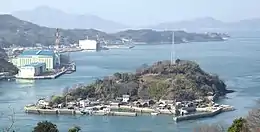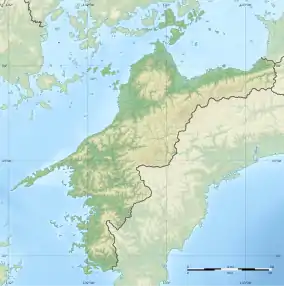Kurushima
Kurushima (来島) is an Japanese island in the Inland Sea. Administratively, it forms part of the city of Imabari, Ehime Prefecture.[1]
| Native name: 来島 | |
|---|---|
 | |
 Kurushima  Kurushima | |
| Geography | |
| Location | Seto Inland Sea, Japan |
| Coordinates | 34°07′04″N 132°58′10″E |
| Archipelago | Japanese Archipelago |
| Area | 0.04 km2 (0.015 sq mi)[1] |
| Coastline | 1 km (0.6 mi)[1] |
| Highest elevation | 45 m (148 ft)[2] |
| Administration | |
Japan | |
| Prefecture | Ehime Prefecture |
| City | Imabari |
| Demographics | |
| Population | 32 (2009)[3] |
Geography
Kurushima is situated some 240 metres (790 ft) off the coast of Shikoku's Takanawa Peninsula (高縄半島) at the entrance to Hashihama Port (波止浜港) in Imabari.[1][2] The island has a coastline of approximately 1 kilometre (0.62 mi) and a surface area of 0.44 square kilometres (0.17 sq mi).[1] It is a natural fortress with cliffs to the north shaped by the fast currents (some 8 knots (15 km/h; 9.2 mph) to 10 knots (19 km/h; 12 mph)) and rocks below; there is a settlement on the flatter land to the south, around a small bay.[1][2][3] To the east, the Kurushima Straits (来島海峡) are spanned by the Kurushima Kaikyō Bridge, while the island is protected as part of Setonaikai National Park.[4]
History
During the Sengoku period, the island was the base of the Kurushima Murakami, one of the three main houses of the Murakami kaizoku (the others the Noshima Murakami and Innoshima Murakami).[5] There are still remains of the walls of Kurushima Castle (来島城), an element of Japan Heritage "Story" #036,[6] as well as traces of residences and wells.[3] In the Edo period, together with nearby Oshima (小島), the island was part of Kurushima Village (来島村) in Matsuyama Domain, with an assessment of twenty-six koku, three to, and nine shō.[2] Around the end of the Kyōhō era in the early eighteenth century there were some seventy-eight households, fifty-three of them of fishermen.[2] By Shōwa 53 (1978) this number had dropped to thirty-nine households, primarily making a living by commuting to the local shipyards and line fishing.[2] As of 2009, Kurushima had thirty-two residents.[3]
Related maps
.jpg.webp) 1953 US AMS map showing Hiroshima Prefecture and, across the sea to the south, Imabari in Ehime Prefecture; Kurushima is the small unmarked island near the bottom, to the right of the tip of what is marked Shikoku, just above Hashihama and to the southwest of "O-shima" ("Ko-jima" on the next map)
1953 US AMS map showing Hiroshima Prefecture and, across the sea to the south, Imabari in Ehime Prefecture; Kurushima is the small unmarked island near the bottom, to the right of the tip of what is marked Shikoku, just above Hashihama and to the southwest of "O-shima" ("Ko-jima" on the next map).jpg.webp) 1946 US AMS map showing "Kuru-shima", to the southest of "Ko-jima" ("O-shima" on the previous map)
1946 US AMS map showing "Kuru-shima", to the southest of "Ko-jima" ("O-shima" on the previous map)
See also
| Wikimedia Commons has media related to Kurushima Strait. |
References
- 来島 [Kurushima] (in Japanese). Ministry of Land, Infrastructure, Transport and Tourism. Retrieved 21 August 2020.
- 来島 [Kurushima]. Kokushi Daijiten (in Japanese). Yoshikawa Kōbunkan 吉川弘文館. 1979–1997.
- 来島 [Kurushima]. Encyclopedia Nipponica (in Japanese). Shōgakukan. 2001.
- 愛媛県地域(今治南) [Setonaikai National Park: Ehime Region (Imabari City)] (in Japanese). Ministry of the Environment. Retrieved 21 August 2020.
- Shapinsky, Peter D. (2009). "Predators, Protectors, and Purveyors: Pirates and Commerce in Late Medieval Japan". Monumenta Nipponica. Sophia University. 64 (2): 292.
- "Story #036 Murakami Kaizoku". Agency for Cultural Affairs. Retrieved 21 August 2020.
External links
- (in Japanese) Japan's outlying islands (MLIT)
- (in Japanese) Detailed maps of Setonaikai National Park (Ministry of the Environment; Kurushima is in 愛媛県地域(今治南))